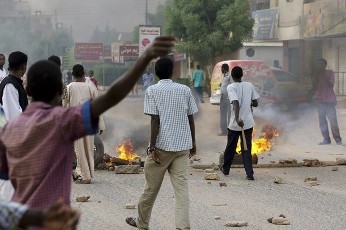Sudan opposition alliance threatens to call for protests over lifting subsidies
September 9, 2013 (KHARTOUM) – The Sudanese opposition umbrella organization known as the National Consensus Forces (NCF) has announced that it is planning to organize public sit-ins to resist the government’s anticipated decision by which it will lift subsidies on basic commodities.

Omer asserted that these figures prove that the government does not actually subsidize fuel prices.
He accused the ruling National Congress Party (NCP) of being indifferent with regard to the economic crisis in order to clinch to power at the expense of the Sudanese people, adding that the increase in the dollar exchange rate for customs purposes from 4 to 6 pounds had an adverse effect on the prices of the basic commodities.
The opposition figure downplayed the impact of the consultations held by the finance minister Ali Mahmoud Abdel-Rasool with the political forces in order to rally support for the decision to lift subsidies, pointing that the minster’s efforts in this regard proved futile.
He further pointed that the government is facing a serious crisis due to the budget failure and the expansion in security spending, predicting that the parliament will receive and approve and the decision to lift subsidies with “clapping”.
In a related issue, the opposition Popular Congress Part (PCP) accused the government of misleading the public by publishing false reports about economic growth figures over the past years.
The PCP urged the government to declare its failure and abandon power and declared its rejection to lifting subsidies.
The PCP’s Secretary General assistant for Economic Affairs, Hassan Sati, said that the government reached an impasse and explained that the Sudanese economy is facing what he described as an inflationary recession due to the decline in production and rising prices.
Sati said that the only way for emerging from the economic crisis is conditional upon regime change, saying that the government lost the trust of the international financing institutions.
The PCP official described this year’s budget as “weak” and said that its deficit ratio reached 12% and that public revenues cover only 40% of the public expenditure which forces the government to borrow the remaining 60% to cover the deficit.
Sati emphasized that the government does not have a vision to overcome the economic crisis and added that lifting subsidies will not help unless the government injects money into the budget.
“Over the past years, the government sought to withdraw money from the economy instead of injecting money into it,” he said.
He criticized the government for spending millions of US dollars in arms purchases while the economy suffers from clear imbalances.
Sati warned against total dependence on the imports of basic goods and lack of interest in domestic production and considered it a serious threat to Sudan’s food security, holding the government responsible for what he described as the “dire economic situation”.
He said that Khartoum is paying the price for its wrong policies and predicted that the crisis would further exacerbate, describing the government tripartite economic program as “ink on a paper”.
The tripartite program was meant to help Sudan cope with the impact of losing most of the country’s oil after South Sudan secession in July 2011.
By contrast, the head of the parliamentary subcommittee on Economic Affairs, Omer al-Amin, said that the 2014 budget is promising and will meet the basic needs of the people.
He declined to comment on the government’s decision to lift fuel subsidies, saying that he just arrived from Lebanon where he attended a training course on how to create a realistic budget.
The opposition Sudanese Communist Party (SCP) also announced its rejection to lifting fuel and goods subsidies calling upon Sudanese people to resist it through the various kinds of mass struggle.
The SCP spokesperson, Youssef Hussein, said in a press release on Monday, that the presidential assistant Abdel-Rahman al-Mahdi and the financial minister, Ali Mahmoud Abdel-Rasool, asked for a meeting with the SCP leadership to discuss the matter.
“We accepted to meet with them and we set a date for the meeting in our party’s headquarter”, Hussein said.
Hussein said that the government request for meeting with the SCP coincides with its implementation of the decision to lift subsidies, noting that an unannounced increase in customs duties has already begun.
Hussein said that the government does not grant subsidies, accusing it of seeking to hold the opposition forces responsible for its failed policies including the destruction of the economy pillars and secession of South Sudan.
He complained that the government spends 70% of its budget on security and military in order to protect the regime, accusing it of demanding the Sudanese people to bear the cost of their own suppression and starvation.
The leader of the Democratic Unionist Party (DUP), Mohamed Osman Al-Mirghani, instructed his party’s organs to form a committee to study the government’s anticipated decision calling upon the committee to conduct its work in accordance with principle of alleviating the suffering of the citizens.
According to a press statement issued by Al-Mirghani’s office on Monday, the committee submit its recommendations to the party leader to make the decision which serves the interest of the nation and citizens.
Sudan lost 75% of its oil reserves after the southern part of the country became an independent nation in July 2011 denying the north billions of dollars in revenues.
Prior to the country’s breakup, Sudan produced close to 500,000 barrels but now its output is limited to 140,000 barrels per day. Oil revenue constituted more than half of the Sudan’s revenue and 90% of its exports.
Following the independence of South Sudan in July 2011, Khartoum was forced to introduce a contractionary budget that saw the partial lifting of fuel and food subsidies which triggered rare but small demonstrations across the country.
The government defended the measures saying that the country can no longer afford to pay for these subsidies.
(ST)
